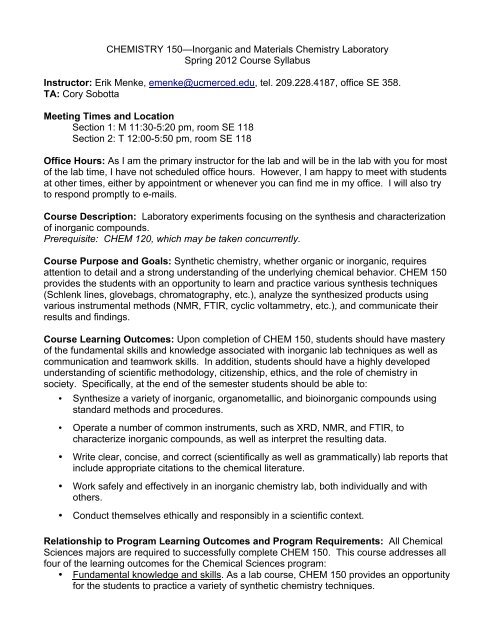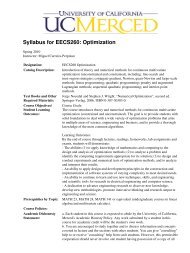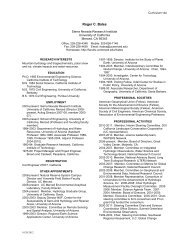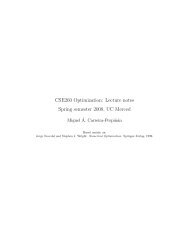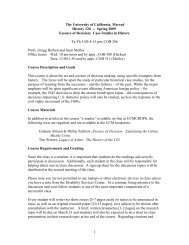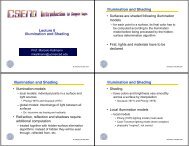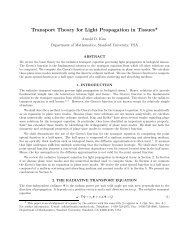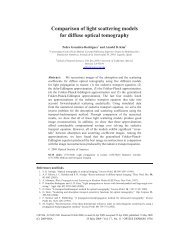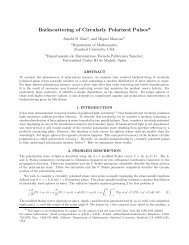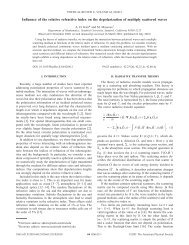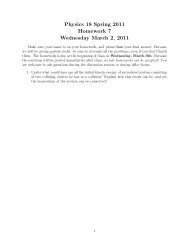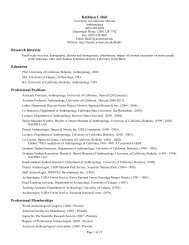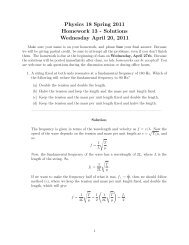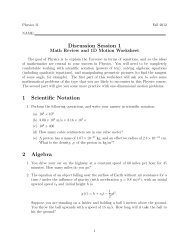Chem 150 - Faculty
Chem 150 - Faculty
Chem 150 - Faculty
You also want an ePaper? Increase the reach of your titles
YUMPU automatically turns print PDFs into web optimized ePapers that Google loves.
CHEMISTRY <strong>150</strong>—Inorganic and Materials <strong>Chem</strong>istry Laboratory<br />
Spring 2012 Course Syllabus<br />
Instructor: Erik Menke, emenke@ucmerced.edu, tel. 209.228.4187, office SE 358.<br />
TA: Cory Sobotta<br />
Meeting Times and Location<br />
Section 1: M 11:30-5:20 pm, room SE 118<br />
Section 2: T 12:00-5:50 pm, room SE 118<br />
Office Hours: As I am the primary instructor for the lab and will be in the lab with you for most<br />
of the lab time, I have not scheduled office hours. However, I am happy to meet with students<br />
at other times, either by appointment or whenever you can find me in my office. I will also try<br />
to respond promptly to e-mails.<br />
Course Description: Laboratory experiments focusing on the synthesis and characterization<br />
of inorganic compounds.<br />
Prerequisite: CHEM 120, which may be taken concurrently.<br />
Course Purpose and Goals: Synthetic chemistry, whether organic or inorganic, requires<br />
attention to detail and a strong understanding of the underlying chemical behavior. CHEM <strong>150</strong><br />
provides the students with an opportunity to learn and practice various synthesis techniques<br />
(Schlenk lines, glovebags, chromatography, etc.), analyze the synthesized products using<br />
various instrumental methods (NMR, FTIR, cyclic voltammetry, etc.), and communicate their<br />
results and findings.<br />
Course Learning Outcomes: Upon completion of CHEM <strong>150</strong>, students should have mastery<br />
of the fundamental skills and knowledge associated with inorganic lab techniques as well as<br />
communication and teamwork skills. In addition, students should have a highly developed<br />
understanding of scientific methodology, citizenship, ethics, and the role of chemistry in<br />
society. Specifically, at the end of the semester students should be able to:<br />
• Synthesize a variety of inorganic, organometallic, and bioinorganic compounds using<br />
standard methods and procedures.<br />
• Operate a number of common instruments, such as XRD, NMR, and FTIR, to<br />
characterize inorganic compounds, as well as interpret the resulting data.<br />
• Write clear, concise, and correct (scientifically as well as grammatically) lab reports that<br />
include appropriate citations to the chemical literature.<br />
• Work safely and effectively in an inorganic chemistry lab, both individually and with<br />
others.<br />
• Conduct themselves ethically and responsibly in a scientific context.<br />
Relationship to Program Learning Outcomes and Program Requirements: All <strong>Chem</strong>ical<br />
Sciences majors are required to successfully complete CHEM <strong>150</strong>. This course addresses all<br />
four of the learning outcomes for the <strong>Chem</strong>ical Sciences program:<br />
• Fundamental knowledge and skills. As a lab course, CHEM <strong>150</strong> provides an opportunity<br />
for the students to practice a variety of synthetic chemistry techniques.
• Scientific methodology. CHEM <strong>150</strong> requires the students to both gather and interpret<br />
data based on experiments they perform, and critically analyze these results based on<br />
their knowledge of the system studied.<br />
• Communication and teamwork skills: CHEM <strong>150</strong> requires written lab reports on each<br />
lab performed, and a number of the labs are done either with partners or in groups.<br />
• Ethics, citizenship, and role of chemistry in society: In a lab course, students must be<br />
completely honest and ethical in their reporting of experimental results, and must often<br />
grapple with "gray areas" such as when it is permissible to "throw out" a piece of data.<br />
Course Structure: This course consists of nine experiments in synthetic inorganic chemistry.<br />
Some of these experiments will be done individually, which means that you will be allowed and<br />
encouraged to discuss the experiments with other students, but you will be responsible for<br />
obtaining and interpreting your own data. Due to space and equipment limitations a number of<br />
these experiments will be done in small groups on a rotating basis. Each experiment is<br />
allocated between one and two class periods depending on its length and complexity.<br />
While I will start each experiment with a brief explanation of the procedure and expected<br />
results, you will need to read and think about the procedure before you come to lab, as well as<br />
carry out any preliminary calculations that will be necessary for your experiment. This is both<br />
to make sure that you are spending your time in the lab efficiently, as well as to ensure that<br />
you are working safely.<br />
Each student will hand in a typed lab report for each of the nine experiments. These lab<br />
reports are to be prepared individually, even for experiments done with others. The lab reports<br />
are due fourteen days after the end of each experiment. Your lowest short score will be<br />
dropped.<br />
There are no quizzes or exams for this course. However, for each experiment I will evaluate<br />
your performance and assign a score of zero, one, or two points. A number of factors will be<br />
taken into consideration for this performance score, including your preparedness, efficiency in<br />
the lab, cleanliness, safety, and doing your fair share when working in groups.<br />
Grading System: CHEM <strong>150</strong> can only be taken for a letter grade. Grades in CHEM <strong>150</strong> will<br />
be based on lab reports and in-lab performance evaluations according to the following scales:<br />
Best 8 lab scores (lowest dropped) @ 9 points each 72 points<br />
9 lab skill evaluations @ 2 points each 18 points<br />
Lab notebook 10 points<br />
Total 100 points<br />
Grades will be assigned according to a standard 10-point scale, with +/- to be left to the<br />
instructor's discretion.<br />
Notebook: The lab notebook is a permanent record of your work and all scientists keep<br />
notebooks for later reference. The basic guideline is simple. A scientist with your level of<br />
training should be able to take your notebook and reproduce exactly what you have done in<br />
your notebook. This is not difficult to achieve, but it does require practice and diligence. Your<br />
notebook must always be current and complete. This means that you need to write what you<br />
have done, as you do it. Do not take notes on a separate piece of paper and transcribe them to<br />
your notebook at a later time. Do not write your notes from memory during dinner. Your<br />
notebook is not meant to be neat or pretty, but current and complete.
A complete notebook has:<br />
• Sequential page numbers.<br />
• All notes in permanent ink (black or blue).<br />
• Dates and times when procedures are performed or data recorded<br />
• All data, either written in a table or glued securely<br />
Lab Reports: A formal lab report is required for each experiment from each student that<br />
performs the experiment (i.e. each student will turn in their own report). Reports are to be<br />
written as if you were submitting the work for publication as a communication article to the<br />
ACS journal Inorganic <strong>Chem</strong>istry. You can find the author guidelines at<br />
http://pubs.acs.org/paragonplus/submission/inocaj/inocaj_authguide.pdf as well as a MS Word<br />
template at http://pubs.acs.org/page/inocaj/submission/templates.html. The names of all the<br />
students who worked on the lab must be listed as authors, with the student submitting the<br />
report listed as the first author. In addition, you must address all of the questions posed at the<br />
end of the experiment in the lab text. This must be done in the body of the report, as there is<br />
no "Answers" section in journal articles.<br />
Required Materials:<br />
Text: "Synthesis and Technique in Inorganic <strong>Chem</strong>istry: A Laboratory Manual" 3 rd edition, by<br />
Gregory S. Girolami, Thomas B. Rauchfuss, and Robert J. Angelici. ISBN 978-0935702484.<br />
Other Materials:<br />
-A bound laboratory notebook.<br />
-Safety goggles.<br />
-A lab coat.<br />
-A USB drive (for saving data from instruments).<br />
Class Policies: While you are in the lab, I expect you to act in a professional and responsible<br />
manner. This means that you should show up to each lab period on time and prepared to<br />
work, dressed in the appropriate attire. You should be focused on what is happening in the<br />
lab. This means that you should not be surfing the internet, texting your friends, or having<br />
conversations on the phone. While there will be downtime during some of the experiments,<br />
you should use that time to your advantage, i.e. asking questions, working on your lab reports,<br />
interpreting results, etc.<br />
Safety: Inorganic and organometallic compounds are generally more toxic, carcinogenic, and<br />
reactive than organic compounds. In addition, a number of experiments are in this lab are<br />
carried out under vacuum or high-pressure conditions. For these reasons, you are expected to<br />
wear goggles and a lab coat at all times. In addition, if you are presenting a serious risk to<br />
either yourself or those around you, I will not hesitate to kick you out of the lab.<br />
Academic Integrity: This is a topic that I take very seriously. While I understand that<br />
shortcuts are attractive, they very rarely end up helping in the long run. Dishonest practices,<br />
like cheating and plagiarism, typically prevent you from understanding the material, which is<br />
ultimately why you are here in school. A full description of the University policy, as well as the<br />
judicial process and potential penalties, can be found on the student life website<br />
(studentlife.ucmerced.edu/what-we-do/student-judicial-affairs/academicy-honesty-policy).<br />
Students should be familiar with the University policy as anyone caught violating it will be dealt<br />
with harshly.
Disability Services: A disability should not impede learning. To this end, UC Merced<br />
provides a number of options to help students with disabilities succeed in their academic<br />
career. If you have a disability, I encourage you to contact the University Disability Services<br />
Office to find out how they can help. You can find more information on their website<br />
(disability.ucmerced.edu), e-mailing them at disabilityservices@ucmerced.edu, or calling them<br />
at 209.228.6996.<br />
Lab starting on:<br />
Schedule (subject to revision)<br />
January 21 st :<br />
Class overview. Lab safety. Lab report expectations. No report due.<br />
Working in groups of 2:<br />
January 28 th :<br />
Synthesis of the layered solids VO(PO4)(H2O)2. 2 periods.<br />
February 11 th :<br />
Preparation of molecular sieve Zeolite-X. 2 periods.<br />
February 25 th :<br />
Tin chemistry. 2 periods.<br />
Working in groups of 4, rotating through<br />
March 11 th :<br />
Synthesis of YBa2Cu3O7. 1 periods.<br />
March 18 th :<br />
Paramagnetic Mn(acac)3. 1 periods.<br />
April 1st:<br />
Microscale synthesis of IrCl(CO)[P(C6H5)3]2. 1 periods.<br />
April 8 th :<br />
C60 and its electrochemistry. 1 periods.<br />
April 15 th :<br />
Copper (II) Tetraphenylporphyrinate. 2 periods.<br />
Working in groups of 2, same week:<br />
April 29 th :<br />
Four-coordinate Nickel (II) Complexes. 2 periods.


